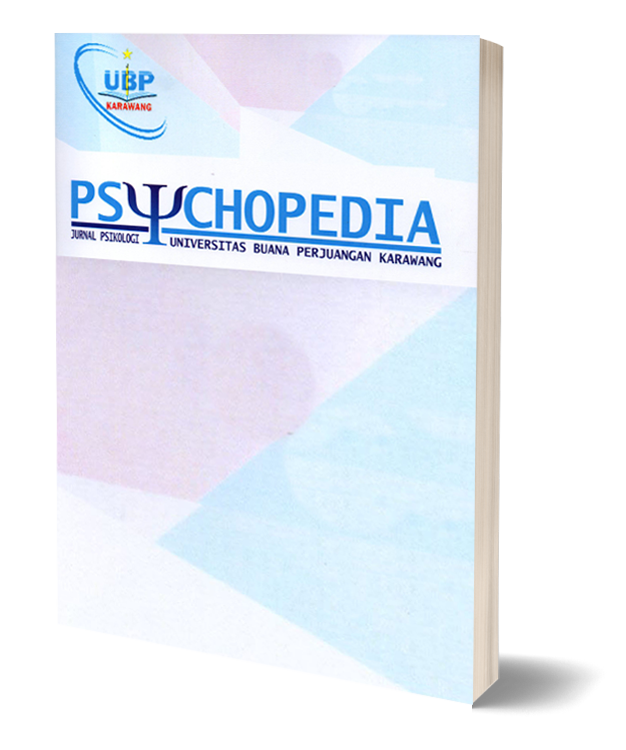PENERAPAN PSIKOLOGI PENDIDIKAN PADA PEMBELAJARAN AGAMA ISLAM DI MTS DARUL MA’RIFAH RANGKASBITUNG
DOI:
https://doi.org/10.36805/psychopedia.v10i1.10463Keywords:
psychology (reinforcer and Punisher), PAI LearningAbstract
The study of Islamic religion in schools, some of the most necessary ways to apply by educators is to provide the right strengthening (reinforcer) and Punisher to the learners. By providing reinforcement and punishment, learners will feel rewarded and given attention in all its efforts and behaviors and achievements. Most educators are less concerned about taking an action, because as small as any act of teacher will certainly bring positive and negative impacts to students. An educator must be wise and think first in taking an action. The more precise the action given makes the student motivated to learn. Because learning will bring a change to the individuals who do it. Changes are not only related to the addition of science, as well as skill, skills, attitude, self-esteem, interests, self-adjustment to students. This research aims to describe the implementation of Reinforcer and Punisher in MTs Darul Ma’rifah Rangkasbitung and describe any supporting factors and Reinforcer (reinforcement) and Punisher (punishment) students in MTs Darul Ma’rifah Rangkasbitung. This research is field research, qualitative research is a study that uses natural background, with the intent of interpreting the phenomenon occurring and carried out by way involving various existing methods with the draft case study Data collection techniques through interviews, observations and documentation. This research uses the approach method. The result of this study is in the implementation of Islamic religious Studies in MTs Darul Ma’rifah Rangkasbitung There are various characteristics of student learning, so when applied according to the appropriate action (Reinforcer and Punisher), then Students will have a good motivation, and the relationship between teachers and students is increasingly supportive in learning and understanding for learners to learn. So that all activities (Reinforcer and punishers) that are doing will always spur student achievement in PAI learning in particular
Downloads
References
Abdurrahman, Mulyono. Pendidikan Bagi Anak Berkesulitan Belajar. Jakarta: Rineka Cipta. 2003.
Ahmadi, Abu. Ilmu Pendidikan. Jakarta: PT Rineka Cipta. 2015 Ahmadi, Abu. Strategi Belajar Mengajar. Pustaka Setia.Bandung. 1997.
Azizah, Mar’atul. Implementasi Manajemen Kelas Dalam Meningkatkan Keefektifan Pembelajaran Tafsir Ahkam Di Mts Al Urwatul Wutsqo Jombang. Jurnal Al idaroh. Vol. 1 No.1 Maret 2017.
Daradjat, Zakiah. Pendidikan Islam Dalam Keluarga Dan Sekolah. Jakarta : Ruhama. 2005.
Hasan, Moch. Sya’roni dan Hanifa Rusydiana. Penerapan Sanksi Edukatif Dalam Peningkatan Kedisiplinan Peserta Didik Di MTs Semesta Kedungmaling Sooko Mojokerto. Jurnal Cendekia. Volume 4. Nomor 2. Desember 2018.
Iskandar. Metodologi Penelitian dan Sosial.. Jakarta: GP Press. 2008.
Mustaqim. Psikologi Pendidikan. Jogjakarta: Fakultas Tarbiyah IAIN Walisongo Semarang. 2012.
Mustofa, Bisri. Psikologi Pendidikan. Yogyakarta: Parama Ilmu. 2015.
Purwanto, M. Ngalim. Prinsip-Prinsip dan Teknik Evaluasi Pengajaran. Bandung: Remaja Rosdakarya. 2013.
Purwanto, M. Ngalim. Psikologi Pendidikan. Bandung: Remaja Rosdakarya. 2017. Sardiman, A.M. Interaksi dan Motivasi Belajar Mengajar. Jakarta: Rajawali Press 1986.
Slameto. Belajar dan Faktor-faktor yang Mempengaruhinya.. Jakarta: Rineka Cipta 2003.
Slavin ,Robert E. Educational Psychology; Theory and Practice. t.k.: Pearson. 2017. Sudarmawan, Danim. Psikologi Pendidikan Dalam Perspektif baru. Bandung: Alfabeta. 2011.
Sumanto. Psikologi Pendidikan. Yogyakarta: PT Buku Seru. 2014.
Syah, Muhibbin. Psikologi Pendidikan. Bandung: PT. Raja Remaja Rosdakarya 2000.

